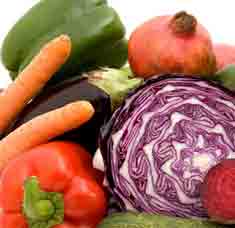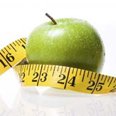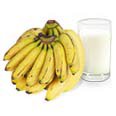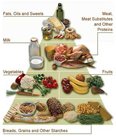Minerals Overview (Cont/d)
A - Z Minerals - Micro Minerals
age-well.org > Vitamins and Minerals – Introduction > A -Z Minerals – Page 2 - Micro Minerals

This part of the Overview of Minerals contains information about the micro-minerals or trace elements, so called because our bodies only need small quantities to function healthily. In some cases dietary needs for these micro-minerals has not yet been established.
Macro Minerals
On Previous Page
Calcium (Ca)
Magnesium (Mg)
Phosphorus (P)
Micro Minerals
On this page
Chromium (C)
Copper (Cu)
Chlorine (Cl) / Chloride
Fluorine (F)/ Fluoride
Iodine (I)
Iron (Fe)
Manganese (Mn)
Molybdenum (Mo)
Potassium (K)
Selenium (Se)
Sodium (Na)
Sufur (S)
Zinc (Zn)
Micro Minerals
Functions: : This mineral increases insulin function to aid the metabolism of carbohydrates, fats and proteins.
Food Sources: meat, whole-grain foods, vegetables such as broccoli, green beans and potatoes, fruits and fruit juices.
Deficiency: Foods with high levels of simple sugars decrease chromium absorption and will increase the body’s need for insulin whilst decreasing its ability to use glucose.
Overdose None
Recommended Daily Intake: 35 ug
Functions:Responsible for hemoglobin and melanin production and helps maintain healthy bones, nerves and immune system.
Food Sources: shellfish, nuts, whole-grain foods, beans, meats (organs i.e. liver), dark leafy green vegetable and dried fruits.
Deficiency: Can result in anemia and loss of energy and osteoporosis.
Overdose Too much copper is poisonous and can lead to nausea, vomiting, diarrhea, abdominal pain and fatigue. More severe cases can cause liver damage, kidney failure and potentially death.
Recommended Daily Intake: 0.9 mg
Functions:Chromium helps maintain the acid- base (alkali) levels in the blood and is important in Hydrochloric acid production in the stomach (used in digestion). It is also present as the negative ion chloride in body fluids.
Food Sources: all types of salt (sodium chloride), vegetables and in foods such as seaweed and rye.
Deficiency: Can lead to alkalosis (excess alkali in the blood), dehydration and loss of potassium.
Overdose Can result in fluid retention and high blood pressure.
Recommended Daily Intake: 2.3 g (or 3.8 g as table salt)
Functions:Promotes strong teeth and prevents dental cavities.
Food Sources: Some tap/mineral waters and wines, black tea, gelatin and seaweed.
Deficiency: Weak bones and dental cavities.
Overdose Fluorisis (tooth related problems), osteosclerosis, frequent bone fractures, tremors, loss of hearing, arthritic pain, nausea, vomiting, stomach ulcers and others.
Recommended Daily Intake: 4 mg
More in-depth information on Fluoride
Functions: It helps maintain the body’s metabolic rate and helps produce thyroid hormones.
Food Sources: Breads, fruits, vegetables, dairy products (eggs, cheese & milk), meat, prepackaged/fast foods and seafood.
Deficiency: Can lead to Goiter and a decrease in normal metabolism.
Overdose Can result in enlargement of the thyroid gland (Iodine Goiter), skin lesions, worsened acne and inhibition of thyroid hormone production.
Recommended Daily Intake: 150 ug
Further Information - Iodine
Functions:Iron is an important component of hemoglobin that is used to transport oxygen to human tissue and store/release oxygen for energy in muscles.
Food Sources: Heme iron is present in red meat, fish and poultry. Non-heme iron is found in legumes, dark green leafy vegetables, beans, tofu and fortified cereals.
Deficiency: Anemia, poor transport of oxygen and energy loss
Overdose When in excess, Iron can be toxic. Severe overdoses can lead to heart and liver damages.
Recommended Daily Intake: 18 mg
More in depth information on iron
Functions:Manganese is primarily used for the production of hemoglobin, growth, and maintenance of healthy bones and the activation of some enzymes.
Food Sources: Green vegetables, fruits such as raspberries and pineapples, whole grain foods (e.g. oats and rye) and brown rice.
Deficiency: May lead to tremors, convulsions, nausea, vomiting, high blood sugar, low cholesterol, bone loss, skin rash, dizziness, deafness and difficulties in the reproductive system.
Overdose Manganese overdose is extremely rare but can occur in patients with liver disease. This can lead to hallucinations, violent acts, irritability and impotency.
Recommended Daily Intake: 2.3 mg
Functions: This micro-mineral is a component of enzymes and is needed for the metabolism of iron, carbohydrates and fats. It can also help protect our teeth from tooth decay.
Food Sources: Wheat germ, liver, dark green leafy vegetables, free range eggs .
Deficiency: This is extremely rare but it can lead to irritability and irregular heart beat
Overdose This can lead to gout, kidney stones, anemia, diarrhea, weight loss, retarded growth and joint swelling.
Recommended Daily Intake: 45 ugp>
Functions: Helps muscle and nerve and heart function. It is also an electrolyte which is essential for conduction of nerve impulses and for the maintenance of ion concentration gradients across cell membranes. Its ion K+ is the main positive ion in cells and it is equally present in extracellular fluid.
Food sources: Many vegetables (e.g. tomatoes and potatoes) and fruits such as bananas, citrus. Meat (including chicken) and many types of fish are also good sources of Potassium.
Deficiency: This will lead to Hypokalemia along with muscle weakness and/or cramps, alkaline urine, abnormal electrocardiogram results, abnormal heart beat and loss of energy.
Overdose: This will result in Hyperkalemia. Symptoms include stomach cramps, diarrhea, palpitations, anxiety, irritability, weak pulse and in sever cases potentially heart failure.
Recommended Daily Intake: 4.7 g
More in-depth information on potassium and its impact on blood pressure.
Functions: Selenium is a component of many enzymes by aiding protein synthesis for antioxidant enzymes which help prevent cell damage.
Food Sources: Vegetables, yeast, wheat germ, red meat, fish, enriched breads (and grains), eggs, chicken and liver.
Deficiency: This can lead to Keshan disease which leads to abnormalities of the heart. Joint and bone diseases, as well as mental retardation have been linked to sever selenium deficiency.
Overdose This is rare but in severe cases can lead to Selenosis. This involves hair loss, nausea, irritability, nail problems, fatigue and minor nerve damage.
Recommended Daily Intake: 55 ug
More in-depth information on selenium and its importance to your health.
Functions: Promotes good muscle and nerve function and regulates blood pressure.
Food Sources: Tomato sauce, soups, condiments, canned foods and prepared mixes. Milk also contains traces of naturally occurring sodium.
Deficiency: Can lead to nausea, vomiting, dizziness, exhaustion and muscle cramps.
Overdose Can result in high blood pressure, heart disease and fluid retention (Edema).
Recommended Daily Intake: 1.5 g (or 3.8 g of table salt)
More information about sodium and why too much is bad for you.
Functions: Component of hormones, proteins and some vitamins (e.g. it is needed to produce vitamin B1). Sulfur also aids the digestion of fats and the metabolism of carbohydrates and it contributes to healthy skin, hair and nails.
Food Sources: Eggs, leafy green vegetables, fish, seafood, meat, dried fruits, milk, nuts (e.g. Brazil and roasted peanuts) and condiments such as pepper.
Deficiency: None
Overdose None
Recommended Daily Intake: Unknown
Functions:This mineral is a component of enzymes and is involved in protein metabolism and the transport and metabolism of carbon dioxide. It is also used to heal cuts and wounds, in DNA synthesis for cell growth and repair and promotes healthy growth and development from the prenatal stage to the adolescent stage. It is also a constituent of the Immune system.
Food Sources: Red meat, poultry, fortified cereals, dairy products (e.g. yogurt), beans, nuts, whole grain products, eggs and yeast.
Deficiency: Compromised protein metabolism and carbon dioxide transport along with retarded growth, decreased immune.
Overdose This can interfere with the intake of other minerals and vitamins such as Magnesium and Copper. When the overdose is severe, the immune system can be compromised and the level of good cholesterol (HDL) can decrease.
Recommended Daily Intake: 11 mg
Heme/non-heme iron
There are two different types of iron.
The heme iron is present in the hemoglobin and myoglobin that is in blood. That is why heme iron is found in red meat where it represents approximately 40 % of total iron.
The non-heme iron is in every other food: vegetables, eggs and dairy products.
A classical omnivore diet provides approximately 15 % of heme iron while a vegetarian diet is 100 % non-heme iron.
The iron found in the vegetable world is not as well absorbed as heme iron. That is why we keep saying that the vegetarians are at risks of deficiencies.
Return to Page One of Minerals Overview - Macro Minerals
Go to Overview-Vitamins
HOME to Age-well
Enjoy this page? Please pay it forward. Here's how...
Would you prefer to share this page with others by linking to it?
- Click on the HTML link code below.
- Copy and paste it, adding a note of your own, into your blog, a Web page, forums, a blog comment,
your Facebook account, or anywhere that someone would find this page valuable.















